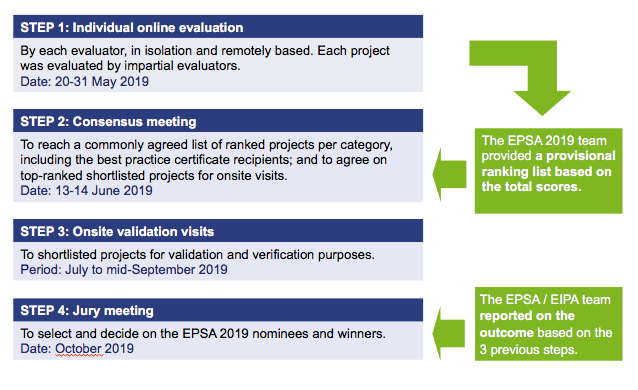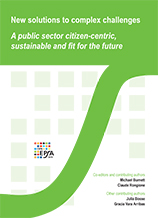EPSA 2019 evaluation and assessment process
All submitted projects, which meet the eligibility criteria, will be assessed against the following six criteria:
- Innovation:i.e. the novelty of the solution, the degree to which the case shows a leap of creativity in the practice of public administration and demonstrates a different approach which goes beyond what was previously applied and how this results from a learning, innovation and self-improvement culture within the entity.
- Stakeholder involvement: i.e. the case shows evidence of stakeholder involvement, e.g. evidence of citizen, business and civil society co-operation and/or response to consultation, evidence of political support, evidence of intelligent engagement with stakeholders that can influence the design and production of services and of intelligent partnership and governance models.
- Relevance of actions taken: i.e. the particular needs and constraints of the context, the core needs of target groups and final beneficiaries and how the actions address their real needs.
- Impact/results: i.e. the realisation of planned objectives and activities by the illustration of proven evidence of benefits, visible impact and tangible results, (which may be based on demonstrably high levels of achievement or the achievement of significant improvements from a low base).
- Sustainability: i.e. the case shows or describes elements which allow it to be sustained beyond an initial period of the realisation of its objectives and of its activities, including considerations offinancial sustainability.
- Potential for adaptability by other entities:i.e. the case has potential value for, and lessons relevant to, other entities because it provides the potential for successful adaptation to other contexts (different Member States and levels of government).
Sufficient detail must also be provided in the applications to demonstrate the quality of the achievements and real outcomes of the case and the lessons learnt.
The assessment is carried out in an independent and impartial multi-step evaluation process.

In the first step, a set number of projects within a concrete award category is allocated to each evaluator based on their professional background and sector (a mix of academia, the practice field and the private sector), nationality (evaluators may not assess projects from their country of origin or employment) and gender. Each project is assessed online, independently and exclusively, by different experts. The evaluators do not know each other, or how the other evaluators assessed the respective project.
During the Consensus Meeting (Step 2), all evaluators come together to review and discuss the first available provisional ranking based on their individual scorings and possible discrepancies. Furthermore, they unanimously decide on the Best Practice Certificate Recipients and on the top short-listed projects in each award category for the onsite visits.
The third step – the onsite visits – serves to validate and verify the results and recommendations of the previous two evaluation steps, i.e. to spot-check whether the content of the application form of the project corresponds to the “reality”; to find the answers to the un-answered questions raised by the evaluators, to detect possible inconsistencies and to gather additional or missing information and data. EIPA representatives do not (re)assess the projects during the validation process!
The fourth and final step consists of the Jury Meeting, where several jurors (high-ranking stakeholders and/or political personalities different to the evaluators) decide on the nominees and the award winners in each category and the third award based on the short-listed projects of the on-site visits.


 EU Commission
EU Commission Austria
Austria Denmark
Denmark Hungary
Hungary Italy
Italy Luxembourg
Luxembourg Netherlands
Netherlands Norway
Norway Province of Limburg
Province of Limburg City of Maastricht
City of Maastricht
